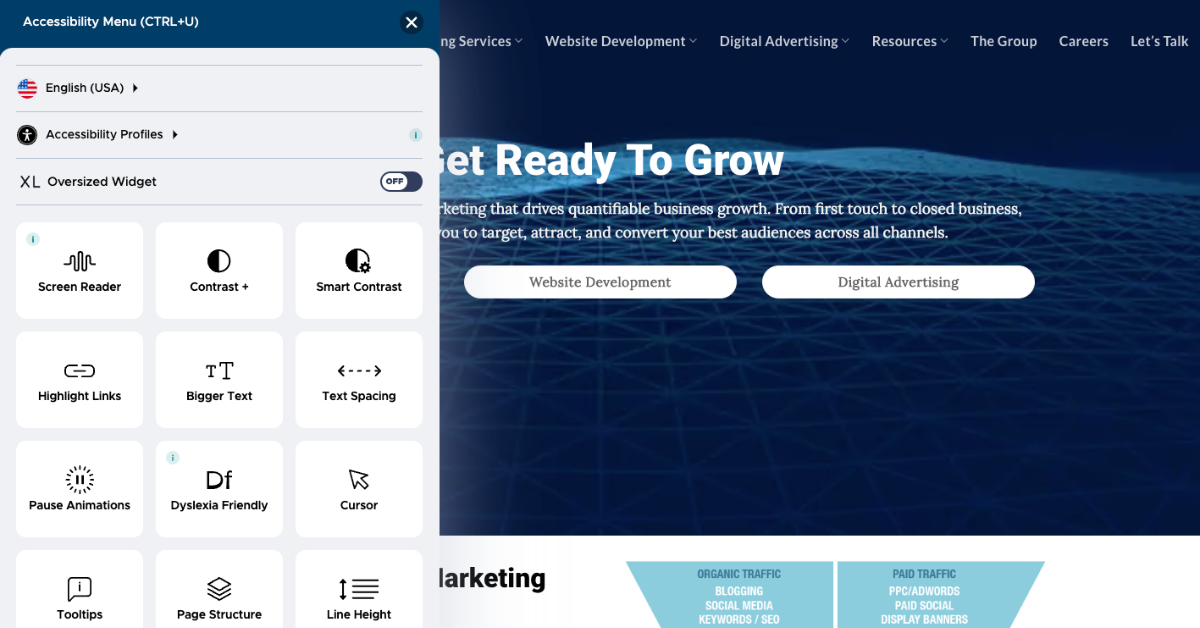Individuals lacking firsthand familiarity with disabilities may not realize that over 25% of adults in the United States possess some form of disability. Consequently, websites in 2024 need to implement accessibility features through the utilization of ADA compliance plugin tools.
Ignoring ADA compliance requirements can have serious repercussions, not only for those with disabilities who could be denied access to information—but also for the website's bottom line. On the other side though, taking advantage of available plugins offers numerous advantages in terms of accessibility and success.
Read on to learn about the most vital reasons every website should have an ADA compliance plugin in 2024.
What Does ADA Compliance Mean for Websites?
The Americans with Disabilities Act (ADA) is a federal law that ensures civil rights protections for individuals with disabilities. It also extends these rights to other protected classes such as race, religion, and sex.
As early as 1998, Congress amended accessibility policies in Section 508, stating that agencies must guarantee the accessibility of their information to disabled employees and members of the public.
Since its initial passage, these website accessibility policies have undergone multiple updates and revisions, including an effort to harmonize with initiatives established by the European Commission and World Wide Web Consortium (W3C). This includes the requirement for companies to maintain compliant websites through a set of best practices referred to as the Web Content Accessibility Guidelines (WCAG).
These regulations protect the disabled community. They also put companies at risk for fines and in a rising number of cases, lawsuits, as seen when Greyhound paid $300,000 for non-compliance in addition to a $75,000 civic penalty.
Web accessibility laws are still new territory in courts of law, and the regulations themselves are constantly evolving to meet public demands. The best way to avoid violations or lawsuits is to improve the accessibility of all digital real estate. For most, this will involve the implementation of accessibility features—customarily achieved through the use of ADA compliance plugin tools—to ensure that websites are available and easy to use for all audiences.

This screenshot demonstrates the accessibility plug-in we have in action on the Snyder Group website. Once in effect, the tool allows users to adjust the font, color, structure, and much more.
Functions of an ADA Plug-In for websites:
There are several common accessibility issues that many websites experience, which leads to poor functionality, especially for people with disabilities. Hyperlinked text—if only distinguishable by color—may not stand out from static text to a person with color blindness. Those with other visual impairments will rely heavily on alt text to interpret website content.
An accessibility plug-in like the one Snyder has in place called UserWay sets out to address issues like these and many more.
The process of onboarding a plug-in like this starts with an Accessibility Audit Report, which assesses a website’s compliance levels against the most recent iteration of the WCAG. Once violations are identified, clear solutions are provided to resolve these.
These audits also provide a paper trail in the event of a complaint by demonstrating a company’s good intentions and its enthusiasm for remediation.
Once the audit is completed and the plug-in is installed, many extant accessibility issues will be programmatically addressed. For example, the look and function of hyperlinked text will become more visible. Alt-text for non-text contact will be applied in addition to captions and transcriptions on videos. For those with limited mobility, keyboard navigation and operation will become possible and easier to operate.
Who Should Have an ADA-Compliant Website and Why?
While all websites should consider implementing accessibility features through the use of ADA compliance plugin tools, certain types of organizations—such as schools, government, healthcare organizations, and retailers—should make this a higher priority, especially if they’re receiving any international traffic.
Not having an ADA-compliant website can result in significant penalties, including fines, legal action, and a negative impact on an organization’s or business's reputation. Additionally, non-compliance may also result in limiting the access of the website to a significant demographic, losing potential customers, and not serving a considerable portion of the population.
An ADA compliance plugin helps to avoid these potential issues while providing a range of benefits for overall website performance such as increased traffic, engagement, and conversion of visitors into customers.
Here is more information on why implementing accessibility features through the use of ADA compliance plugin tools is a valuable investment for your website.
Comply With State and Federal Laws
The government's emphasis on ensuring website accessibility for individuals with disabilities is a logical measure. Failure to implement these laws through ADA compliance plugin tools may result in the alienation of a significant portion of the potential market.
Furthermore, one of the most significant advantages of utilizing ADA compliance plugin tools is the ability to comply with federal ADA laws. Non-compliance with such laws can result in significant penalties, which is why implementing these tools is a crucial step in achieving and maintaining compliance with the ADA and avoiding any potential consequences.
Improve SEO & User Engagement With ADA Website Compliance
The outcome of having accessibility features on a website through ADA compliance plugin tools is an increase in website traffic. This boosted traffic often results in improved engagement, leading to a higher likelihood of converting website visitors into customers.
Beyond that, any business focused on boosting their search ranking through optimization should invest in making their websites accessible as this not only improves user experience but also can lead to more visitors and more potential customers for their clients.
Search engine algorithms are starting to take into account compliance with accessibility laws. By prioritizing the ranking of websites that are compliant with ADA regulations, search engines make it easier for all users to access their services. As a result, following ADA regulations can positively impact a website's search engine rankings.
This improvement in search engine optimization (SEO) is a permanent enhancement that a business can put into place with appropriate ADA compliance plugin tools, which are simple to use and easy to install.
Cultivate a Positive Reputation
Another significant benefit of maintaining an ADA-compliant website is the ability to communicate the values of a company to the public.
Compliance with accessibility laws demonstrates a commitment to providing equal access for all individuals, including those with disabilities. This can foster positive relationships with the disabled community, as well as avoid the potential loss of their patronage and negative word-of-mouth.
Additionally, compliance can improve the company's reputation among all customers and prospects, who are becoming increasingly conscious of accessibility issues.
It can also promote a positive perception of the company among employees and potential employees. This is because non-compliance with the ADA regulations may be viewed as a lack of commitment to accessibility within the company.
Not having these tools in place may limit the accessibility of the website to a significant demographic, resulting in a disadvantage when compared to competitors who have implemented such measures.
Understand the Benefits of Using an ADA Compliance Plugin
ADA compliance is crucial to ensure easy access for individuals with disabilities on a website.
Utilizing ADA compliance plugin tools can provide a range of benefits for a business or organization while fostering positive relationships with the disabled community. These tools enable accessibility for a significant portion of the adult population in the United States.
To learn more about the benefits of using ADA compliance plugin tools, reach out and get in touch with us here at any time.
